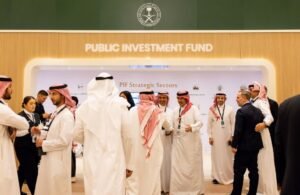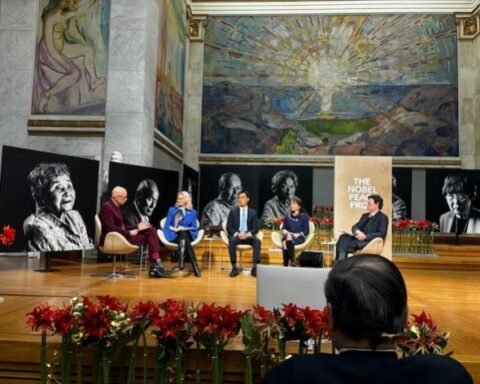FIFA, the organization that oversees international soccer, will convene on Wednesday to select the hosts of the upcoming two men’s World Cups. But the result won’t be shocking.
This is due to the fact that each of the 2030 and 2034 tournaments only has one bid; Saudi Arabia is the only bidder for the 2034 event, while Spain, Portugal, and Morocco will be selected joint hosts of the World Cup in six years.
Although both proposals have been scrutinized, the latter has generated the greatest amount of controversy.
Human Rights Watch (HRW) deputy Middle East and North Africa director Michael Page recently issued a warning about the “unimaginable human cost” of holding what is likely the largest athletic event in the world in Saudi Arabia.
It occurs as a number of human rights organizations express warnings about problems in the Gulf country, such as the mistreatment of migrant workers, freedom of speech, and the rights of minority groups.
What is FIFA saying, though? Why is hosting the event so important to Saudi Arabia? And how can the tournament be made as safe as possible, if at all?
Saudi investment
One must first view the problem in a broader context in order to comprehend it. Saudi Arabia’s World Cup candidacy is part of a larger initiative to invest in sports, not just a one-time event.
In recent years, Saudi Arabia has committed billions of dollars through the Public Investment Fund (PIF), its sovereign wealth fund, to transform sports including boxing, golf, esports, and Formula One.

The country asserts that the investment is a component of Saudi Vision 2030, an initiative spearheaded by Saudi Crown Prince Mohammed bin Salman to diversify the economy and establish Saudi Arabia as a preeminent global nation.
Its emphasis on soccer, arguably the most popular sport in the world, has stood out in particular.
In recent years, Saudi Arabia has acquired Newcastle United, a legendary soccer team in the English Premier League, and persuaded a number of legendary players, including Neymar Jr., Karim Benzema, and Cristiano Ronaldo, to join the Saudi Pro League.
In the process, FIFA President Gianni Infantino, who has continued to embrace investment from the Gulf nation in the sport, has become friends with the Saudi crown prince, who is often known by his initials, MBS.
Therefore, the crowning achievement of the Kingdom’s entry into the sport is hosting a World Cup.
It should come as no surprise that the nation has ambitious intentions for the competition. It has committed to major infrastructure projects, including the construction or renovation of 185,000 new hotel rooms and 11 stadiums.
However, there will be a price for a Saudi World Cup in 2034, according to human rights organizations.
Human rights concerns
According to a recent HRW study headlined “Die First, and I’ll Pay You Later,” Saudi Arabia is attempting to “wash away its poor human rights reputation” by participating in the event.
The treatment of migrant workers, who HRW claims will be disproportionately affected by Saudi Arabia’s World Cup aspirations, is the main emphasis of the report.
There are still a lot of migrant laborers under the “Kafala” sponsorship system, which links individuals to a particular employer. Workers are “vulnerable to widespread abuse, including contract substitution, exorbitant recruitment fees, non-payment of wages, confiscation of passports by employers, and forced labor,” according to a June statement from HRW.
Saudi Arabia has recently proposed a number of reforms, although HRW stated that employers “still hold disproportionate control over workers.”
Among other issues, there are worries about women’s rights, journalistic freedom, and how LGTBQ+ groups are treated.
The human rights risk was rated as “medium” in a recent FIFA analysis that assessed Saudi Arabia’s candidacy.
The information used in the report and designation came from AS&H Clifford Chance, a Riyadh-based legal firm that was entrusted with conducting an impartial human rights evaluation.
FIFA stated in its study that “in the context of Saudi Arabia’s Vision 2030, there is a good potential that hosting the competition could help contribute to positive human rights impacts.”

Regarding the bidding procedure, Lina al-Hathloul, Head of Monitoring and Advocacy at ALQST for Human Rights, questioned the validity of the assessment, pointing out that no independent human rights group has been able to operate in Saudi Arabia.
Al-Hathloul has personal experience with the harshness of Saudi Arabian living under MBS’s control. Her sister was imprisoned in 2018 for being the head of a women’s rights organization, and she is still prohibited from traveling outside. Al-Hathloul, who has fled the country, claims that she hasn’t seen her family in seven years.
“Under Crown Prince Mohammed bin Salman’s leadership, Saudi Arabia is a police state without any checks or balances.”
“We have witnessed an unprecedented level of sexual harassment and torture in prisons, and human rights defenders are imprisoned simply for standing up for women’s rights.” Because my family is related to a women’s rights activist, they are prohibited from traveling.
“I think it’s about red lines, but every country violates human rights, and no country is perfect.” Saudi Arabia has passed that line under MBS today.
Referring to the Saudi Human Rights Commission, the Authority of the Care of Persons with Disabilities, the Ministry of Human Resources and Social Development, the Ministry of Interior, and the Ministry of Sports, it stated that “as a function of this time frame, it is based on desk research and engagement with the Ministries identified.”
There was no interaction with external stakeholders or rightsholders during the assessment process. When considering published commentary, we have concentrated on the observations made by reputable monitoring organizations who are in charge of interpreting and overseeing the Instruments’ application.
FIFA and Saudi Arabia have also come under fire from human rights organizations for failing to guarantee constructive reform.
According to HRW, FIFA should wait to announce that Saudi Arabia would host the World Cup “until migrant workers’ and women’s rights, press freedom, and other human rights are protected.”
Additionally, the governing body was urged to engage with human rights advocates and permit independent monitoring of human rights in the nation.
FIFA has also been urged by Amnesty International to “halt the process” of awarding the tournament to Saudi Arabia “unless major human rights reforms are announced.”
“In keeping with the previous procedures for the selection of hosts for the FIFA Women’s World Cup 2023 in Australia and New Zealand, the FIFA World Cup 2026 in the United States, Mexico, and Canada, and the FIFA Women’s World Cup 2027 in Brazil,” FIFA said in a statement to News Agency about the 2030 and 2034 FIFA World Cups.
Saudi Arabia has previously faced harsh criticism for its human rights record and has fought against claims of “sportswashing,” a practice whereby nations use major athletic events to promote a positive image of their country abroad, frequently to divert attention from suspected wrongdoing.
In a 2023 interview with Fox News, MBS stated that as long as the nation’s investments are “going to increase my GDP by one percent,” he doesn’t “care” if they are characterized as sportswashing.
However, Hammad Albalawi, the leader of Saudi Arabia’s 2034 World Cup bid, claimed earlier this year that the nation had advanced human rights in recent years.
FIFA’s Complicity in Saudi Arabia’s World Cup Bid and the Call for Change
Like many others, he was happy that FIFA was the first international sport organization to incorporate human rights into a bidding process in 2017, but he has been dissatisfied with the way it has been carried out.
“FIFA has an obligation to ensure that it is not negatively affecting workers, fans, activists, and journalists when it is awarding the world’s largest sporting event, which is the most watched and visited,” he stated.
FIFA stated that it only needs to fulfill its own obligations and principles. While it is acting as though it is, it is not following those ranks. That is a very damaging front. Here, we’ve followed a set procedure.
While acknowledging that the procedure has ruined the chance, Al-Hathloul is still hopeful that things can still improve in Saudi Arabia and claims that the people of the nation deserve to enjoy a World Cup.
FIFA, according to her, has been “complicit” in creating an environment in which Saudi Arabia has had little competition and, as a result, no motivation to genuinely advance human rights.
She asserted that “challenging, questioning, and speaking about what is happening in the country are all necessary for change to exist.”
“We now have ten years to inspire others to speak up, ten years to truly question, challenge, and advocate for constructive change.
In most cases, individuals have agreed to take Saudi money in return for remaining silent. People need to have more courage than this, but I do hope that things will change in the next ten years.







